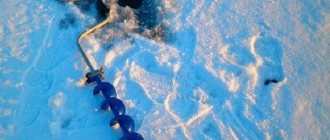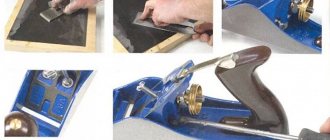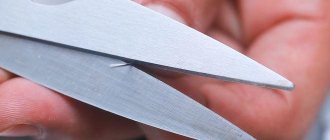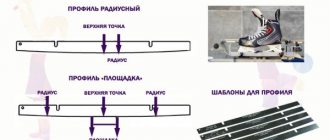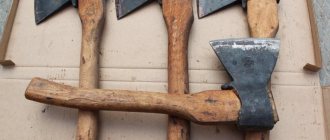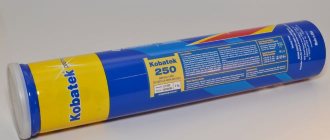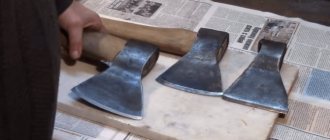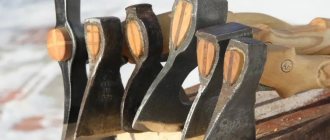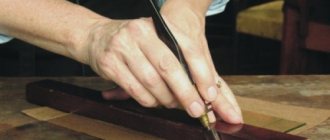One of the main rules for working with a plane, chisel or chisel is the need to work only with a well-sharpened tool. The meaning of this rule is extremely simple - when working with a sharp tool, the risk of damaging the workpiece is reduced to almost zero. That is why every master must not only be well versed in the intricacies of using the tool, but also be able to sharpen and tune it correctly. And you can do this quickly and correctly using a device for sharpening plane knives, which is easy to make yourself from a block of wood and a couple of bolts.
Planer knives: which ones can be sharpened
The main element of the mechanism in question are knives. Their cutting part can wear out quickly under certain conditions. When operating planes, attention should be paid to the fact that there are two types of devices:
- Manual ones are extremely common today. In the manufacture of the main part, plastic, metal or wood can be used. The blade is made using special steel, which is characterized by increased wear resistance.
- Electric planers are used when processing large quantities of material. Thanks to the built-in motor, you can significantly increase the speed and efficiency of the process.
It is necessary to take into account the fact that an electric tool can have several incisors at once. Due to this, the efficiency of the process is significantly increased. The main part is made of tool steel or tungsten. It is worth considering that the tungsten cutting part cannot be sharpened; after severe wear, it must be replaced. In this case, the surface may differ in shape and some other parameters.
Knife design
Before you start learning how to sharpen knives on an electric planer, you need to understand their designs. It consists of two main parts - supporting and working, which contain several elements:
- working angle;
- front corner;
- chamfer on the back of the blade;
- back angle of the chamfer.
When sharpening the cutting element of a power tool, the greatest attention should be paid to the front angle. The smoothness of the surface after planing, the load on the blade, and the efficiency of removing sawdust from the working area will depend on how correctly it was sharpened.
How can you tell if your plane knives need sharpening?
It is important to determine in a timely manner when the surface needs to be sharpened. A device for sharpening plane knives can be purchased or assembled yourself. Among the features we note the following:
- The condition of the cutter can be determined by visually examining the chamfer edge. If upon inspection it turns out that there is a thin shiny tape, then you need to start sharpening.
- Some products are equipped with double-sided knives. If the blade is severely worn, it is rotated, due to this the required performance can be ensured.
A device for sharpening plane knives can be used in accordance with certain recommendations. Do not forget that if you make a mistake, there is a possibility that a serious defect will appear, due to which it will not be possible to remove the material.
What devices can you use?
The easiest and most affordable way to do this kind of work with your own hands is to use a device in the form of a wooden block. The plane knife itself is fixed in its upper part. By placing the block at one angle, you tilt it towards the abrasive. As a result, we get another fulcrum - the edge of the knife itself, which we will sharpen.
A simple device in the form of a block for sharpening plane knives
It is worth remembering that the work should be carried out so that the blade is sharpened at an angle of 30 degrees. Only in this case will your plane work as it should.
To obtain such an angle, you need to correctly select the height of the wooden block and the position of the knife itself on it.
In addition to this simple and homemade method, there are others that are no less effective. To sharpen planer knives with your own hands, all you need is a special block. The process itself must be performed in several stages:
- The first step is to prepare an abrasive stone. It is placed in water for a few minutes. This procedure allows the stone to absorb more water, which means there will be less dust and sparks during operation. After such “bathing”, the abrasive wheel is installed on a sharpening machine;
- Now you need to fix the plane knife in a special block. This device allows you to sharpen at the desired angle. Many manufacturers produce special pads, so choosing the right option will not be difficult. The knife is installed in the designated place and secured with nuts;
- Next, the sharpening itself is carried out. There shouldn't be any big difficulties here. The most important thing is that during this process the balancing of the knife is not disturbed. If this happens, the electric planer will not work properly.
Device with a clamp for sharpening plane knives
Some manufacturers of planes and other carpentry tools produce special devices for sharpening them. For example, you can find a special sharpener on sale. Such a device is capable of sharpening blades from planes and jointers from almost any manufacturer.
To sharpen, you need to install the knife in a special mount. Next, use the templates to set the required angle. The mount itself is equipped with a roller, with its help you can easily perform translational movements, thereby sharpening the blade.
But when using such a device, as with any other method of sharpening, it is necessary to pay special attention to the reliability of fixing the knife. Its plane must remain in place (at a certain angle to the sharpening surface) throughout the entire procedure. If this requirement is not met, the knife will be sharpened unevenly. This means that there is no point in talking about high quality when working.
After sharpening, it is advisable to correct the blade. Even with modern devices, minor defects can still occur. To prevent them from interfering with your work, it is advisable to pass the knife through a barrel-shaped roller. This device allows you to get rid of all small “tracks” and other defects in two or three passes.
How to sharpen planer knives correctly?
A wood planer should be used in accordance with basic recommendations. It is worth considering that you can sharpen a plane only by using the following tools:
- A bar with a fine-grained surface.
- Emery cloth with the required type of grinding wheel.
- A leather belt with a special polishing paste, as well as a grinding stone.
Sharpening a plane at home allows you to quickly restore the condition of the cutting edge. If the knives are severely damaged, a large circle is required, which is designed to remove a large amount of material from the surface. Such a tool eliminates the possibility of the knife bending.
The best type of sandpaper for this task is sandpaper with two different wheels: one with coarse grain, the other with fine grain. This combination provides the most favorable working conditions.
Do not forget that improperly sharpened knives do not provide the proper quality of processing. That is why you need to take the task at hand responsibly.
One of the most important parameters is the sharpening angle. In most cases, this indicator varies from 25 to 45°. The most suitable parameter is selected depending on the hardness of the surface being processed. The angle is maintained when using a special template.
There are quite a large number of recommendations regarding the use of devices for sharpening plane knives. The main ones are the following:
- At the time of work, it is not recommended to apply strong pressure, since in this case a large layer of metal will be removed. Such an error often becomes the reason why the tool simply fails.
- When it comes into contact with the abrasive wheel, the steel heats up, due to which the ductility index significantly increases. That is why a specialist is recommended to periodically cool the metal in water.
- After using a large grinding wheel, finishing is carried out with a fine-grained stone. The final stage consists of applying leather and a special paste, which allows you to obtain a perfectly smooth surface.
The above information indicates that the procedure is very complex to perform. Despite this, it is recommended to carry it out almost immediately after the first signs of loss of sharpening appear. If you postpone such a procedure, then over time the knives may become unusable.
Not all private workshops have special machines for sharpening knives. That is why it is often necessary to use a combination of a block and an abrasive.
It is best to have the knives of electric tools sharpened by specialists, since even minor defects can cause them to become completely unusable. At the same time, the cost of the product is very high.
Tools
0 votes
+
Vote for!
—
Vote against!
The most commonly used tool for processing wood is a planer. However, if the blades in this device are not sharpened properly, the product will acquire uneven edges and is of poor quality. We'll talk about ways to sharpen a plane later.
Table of contents:
- Planer: device, principle of operation and its varieties
- Device for sharpening planer knives
- How to sharpen a plane: process technology
- Machine for sharpening plane knives
Planer: device, principle of operation and its varieties
There are many devices that are used to process wood. Each of them has individual characteristics, functions and purpose. The plane has a long history, but is still used today, almost unchanged.
Among the main elements of this tool we note:
- steel knife;
- block;
- wedge.
The price of a plane is determined by its type, a cheaper manual version of this tool. Before you start sharpening planer knives, you should familiarize yourself with their characteristics.
On the electric version of the plane, the knives are fixed on a special drum. With their help, planing of various kinds of parts is carried out. There are two options for the arrangement of knives: when there is one knife or two knives on the surface of the plane. To make knives, tool steel or tungsten carbide is used. The second option is not suitable for re-sharpening; such knives, if malfunctions occur in their operation, must be replaced.
Depending on the shape of the blades, they can be straight, wavy or curly. Before using the tool, you must check that the knives are installed correctly. The edge of the knife should protrude a few tenths of a millimeter beyond the outer part of the plane. In order to check the quality of the knife position, you should inspect it visually and, if necessary, correct their position.
In order to ensure high-quality finishing of the product, the blade must protrude beyond the surface of the plane by at least 0.5 mm. For rougher processing, a blade protrusion of 1 mm is allowed.
To adjust the knife on an electric planer, turn the adjustment screws to the right or left. Having achieved the required arrangement of the knives, the process stops.
To secure the blade to the surface of the electric plane, a centering lever or screw located on the surface of the top plate is used. Planer knives vary in thickness, some of them are able to withstand the presence of a nail in a wooden piece, while others break. In addition, thicker versions of knives are easier to sharpen, wear out less and have a longer service life.
If there is a shiny strip at the end of the chamfer, it is imperative to sharpen the knife blade. Some models of planes require double-sided knives, which, when dull, are turned over to the other side and used.
Depending on the size, design and other features, there are many options for planes. Among them we note:
- electric plane - the main element of this plane is an electric motor, which significantly increases the productivity of the equipment and the speed of wood processing;
- hand planes - for the manufacture of mechanical equipment, plastic, metal or wood is used, each of these elements has its own advantages and disadvantages in operation, the most common are wooden planes.
In addition, planers are distinguished by the type of surface they process. Among the planes that perform flat planing, we note:
1. A tool in the form of a semi-joint - is a shortened subtype of a plane. The average length of a plane block is no more than sixty centimeters. It is used to process large parts.
2. The bear, unlike a standard plane, has handles on both sides. To hold the knife, this tool uses a special wedge-shaped part. Two people are required to operate this tool. Using this tool, large-sized parts are planed. For example, wood used to sheathe houses, ceilings or floors. The bear allows you to remove a tree in a layer of one millimeter.
3. In order to complete the final stripping of the wood, a tool in the form of a sander is used. This device allows you to clean defective areas, ends, and knots. This plane is distinguished by the presence of a double knife on which a straight blade is located.
4. With the help of zinubel, wooden surfaces become rougher. Thus, by gluing wooden blanks together, they are characterized by increased adhesion. On the surface of the knives there are grooves in the form of notches. Since the knife in the device is at an angle of eighty degrees, jagged edges are not formed during wood processing.
In addition, the following planer options should be highlighted:
- end - suitable for processing wood of a small area with a tangled structure;
- single version of the plane - allows you to perform secondary processing of wood, in the process of work it is possible to obtain ideal shavings;
- A double planer allows you to obtain an ideal quality processed wood surface, thanks to the presence of two knives.
There are also tools that perform figured planing:
1. Planer in the form of a chisel - characterized by the presence of two knives, which can significantly improve the quality of the processed surface.
2. Folding plane - it is used to create longitudinal projections on wooden parts. The tool has a specially shaped blade, with which it is possible to achieve a rectangular protrusion on the part.
3. To strip the quarters, a device in the form of a folding belt is used. It has a single blade and a stepped sole.
4. In addition, there are tools that make wooden blanks rounded and cut longitudinal groove joints on them.
Device for sharpening planer knives
The main signs that a plane needs sharpening is poor performance of its functions: increased time for processing wood, poor quality processing, etc.
If you do not have experience in sharpening a plane, then it is better to entrust this process to professionals. Since an incorrectly sharpened tool is not able to ensure proper processing of the material. In addition, there is a risk of injury during the sharpening process.
Sharpening a plane is a very difficult process, especially if an electric plane can be sharpened. This tool is distinguished by the presence of different blade shapes and sizes. Thus, with the help of straight blades, quarters are selected; more rounded knives allow processing of a large workpiece area.
Blades can be sharpened only if the material for their manufacture is tool steel. Otherwise, they should be replaced with new ones.
High-quality sharpening of plane blades is characterized by the fact that the tool subsequently evenly removes chips from the surface. In order to sharpen a manual plane, you will need:
- emery;
- grinding stones.
These devices for sharpening plane knives are publicly available, however, without the skills to work with them, it is quite difficult to sharpen a plane efficiently. The sharpening process ends with finishing, that is, adjusting the blade so that it removes chips evenly.
If the plane is used to work with wood of increased hardness or with parts that have a large number of knots, then the rate of its dulling increases.
In order to sharpen a plane blade, especially if there are a lot of notches, it is best to use a large-diameter emery wheel. Since during the sharpening process the knives bend slightly and become concave, a circle with a larger diameter prevents this process. However, in the end it is still necessary to align the chamfer to achieve perfect evenness.
It is preferable to choose sandpapers that have two circles with small and large grains. In this way, it will be possible to achieve a perfect fit of the plane knives. The sharpening angle of the plane is also particularly important, since the quality of the sharpened surface depends on it.
The knife should not be pressed too hard against the wheel during sharpening, as too much metal will be removed. In addition, it is advisable to cool the blade in cold water during the sharpening process, since there is a risk of its deformation during the heating process.
After the blade has been sanded, it is finished with a fine-grain stone and polishing paste. This process takes a lot of time and requires a lot of effort; to ensure that the blades do not become too dull, it is preferable to sharpen them periodically.
If the blade is not periodically corrected and sharpened, then the quality of the processed parts decreases, the knives wear down and need to be replaced. The sharpening angle of the plane knife is from twenty-five to forty-five degrees. The exact sharpening angle determines the hardness of the material from which the blade is made. In order to check the sharpening angle of the blade, you should use a self-made template.
How to sharpen a plane: process technology
Sharpening a plane also involves setting it up and adjusting it. This process is based on installing the blade and adjusting the amount by which it extends beyond the sole. To determine this value, you should inspect the tool, from the beginning to the sole. If you roll the knife out of the plane too much, the shavings will become thicker during operation, and the wood will look chewed.
If the blade were installed in a shekhrebel, then this fact would be normal, since this tool undergoes rough processing of wood. However, the plane processes the wood to a perfectly smooth state, and the chips that are removed from it should be moderately thin and uniform.
If the knives are installed with too little clearance, then the chips will practically not be removed from the surface. In this case, the time for processing wood will increase several times. If the blade is not installed equally at the front and bottom of the plane, it will be almost impossible to achieve perfect evenness.
To install the blade in a level position, you should be guided only by inspecting the tool and periodically checking it for functionality. Before tightening the screw, you should check the plane on the rough wood; if necessary, adjust the blade in one direction or another.
The wedge that clamps the blade in the plane must be properly installed on the plane, since in the process of shifting it, the blade will be deformed. Use a hammer to drive the wedge. And to weaken the plane blades, you should apply several blows to the back surface of the plane using a mallet. Tapping on the back of the block increases the protrusion of the blade on the plane; tapping on the front, this value decreases.
Some models of planes are distinguished by the presence of adjusting screws that make it easier to install the blades.
Machine for sharpening plane knives
The simplest device for sharpening a plane is a block, the upper part of which is equipped with a knife and a chisel. The angle at which sharpening is carried out depends on the height of the bar in relation to the abrasive. During the sharpening process, one side of the blade is installed on the abrasive part of the device, and the other on the second part of the block. In order for the block to glide well over the surface, thereby sharpening, place a stand made of glass under it.
The only drawback of this device is that only a small part of the abrasive is used, so the sharpening process takes longer. Some devices are equipped with roller mechanisms that ensure high-quality sliding.
In appearance, the tool for sharpening the plane iron has the appearance of a steel box, inside of which there is a shelf. The clamping screw secures the blade being sharpened. The rollers are installed on an axis that can be sharpened. During operation, the tool is pumped over the abrasive surface. It is necessary to ensure that the blade is pressed evenly on the surface.
Checking Blade Adjustment
After carrying out the procedure in question, the position of the knives should be adjusted. After installing them, you need to inspect the plane and evaluate how far the blade extends. The main recommendations are the following:
- The optimal value is 0.5 mm. If you need to carry out rough processing and at the same time significantly increase productivity, the blade is moved out by 1 mm.
- It is worth considering that too much clearance causes large chips to be produced. Therefore, conditions for obtaining a high-quality surface are not provided. If the gap is minimal, then the chip size will be insignificant, and this will lead to a significant increase in the processing time.
Do not forget that in comparison with other tools, this one is used for finer processing. Taking this into account, the location of the blades is adjusted, and the corresponding blade sharpening angle is selected.
Types of knives for electric planers
Knives on an electric planer are consumables. With their help, wood surfaces are processed.
Often knives come complete with power tools in the amount of 2 pieces.
Electric planer knives are classified according to the following criteria:
- opportunities for practical reuse;
- blade shape;
- knife blade sizes;
- cost.
When buying an electric planer, in addition to checking its performance and configuration, you should pay attention to the quality of the knives installed on the drum and their sharpening. The blades should be sharp, with a straight edge and no bends or gouges. Spare knives should also be checked. The final quality of lumber processing depends on the correct selection of cutting attachments.
How to evaluate the quality of sharpening?
Having maintained a certain sharpening angle of the plane knife and carried out the final grinding, you should check the quality of the work done. It is worth considering that quality is determined by the type of chips obtained.
The check involves running a plane over the surface of the workpiece. If the surface turns out smooth, then the procedure performed was correct.
Self-sharpening of electric planer blades
Reusable knives require re-sharpening after long-term use.
Sharpening a plane with your own hands at home is done in the same way as a hand tool. The difference is the number of cutting edges that require sharpening. To sharpen the blade yourself, you need to have several special devices:
- Sharpening stone.
- Emery.
- File.
To work, you will need a clamp to secure the part to be sharpened on the workbench. The knives are fixed so that the cutting edges are in the same plane.
All blades are sharpened simultaneously with a file or emery. There should be no deviations. The sharpness of the blade is checked on any wooden board.
To make the work easier, pre-moisten the abrasive stone with water. For initial processing, coarse-grained abrasives are used, and fine-grained abrasives are used for finishing. It is desirable that the sharpening angle of the knife is 30 degrees. When the cutting edge is severely damaged, it is better to sharpen it on a special sharpening machine.
Types of equipment for sharpening knives
The device used for sharpening planer knives can be classified according to a fairly large number of different characteristics. Among the features of the classification, we note the following points:
- There are manual and mechanized devices. The first option is easier to use and much cheaper, while the second allows you to significantly increase processing speed. Electric tools have become quite common these days.
- When considering the device for sharpening planer knives, you should pay attention to the grain size of the abrasive. Too large grains cause rapid material removal; reducing their size allows you to reduce the thickness of the removed layer in one pass.
- There are homemade and purchased devices. A homemade sharpener copes with the task.
A large number of different companies are engaged in the production of sharpening devices. In many ways, the popularity of the brand determines the cost of the mechanism.
Why is hand sharpening necessary?
Hand plane sharpening is used exclusively for its intended purpose. Among the features of use, we note the following:
- The device is suitable for sharpening the cutting edge of a plane, as well as many other products.
- A similar mechanism can remove metal from the surface. The abrasive can have different grain sizes, which determines the amount of material removed in one pass.
In most cases, a manual device is used when it is necessary to process a complex surface. Unlike electrical equipment, the mechanism is quite simple and costs a small amount. Also, when using such a tool, a knife can be sharpened, which also has a cutting edge.
Geometry of a plane blade, chisel, chisel
The optimal profile of the cutting edge of a carpentry tool was formed experimentally. It is slightly different from the usual cross-section of a regular knife, described in the article on the rules for sharpening a blade.
Although the blade blade also has a rectangular shape.
A one-sided profile is created in the cross section of the carpentry tool blade.
We can say that the plane of the bevels is aligned with the approach, and the cutting edge is finally finished due to the formation of micro-approaches during polishing on the grinding belt.
The sharpening angle can vary from 25 to 45 degrees. It depends on the density of the wood being processed.
Sharpening plane knives on a machine and adjusting them
It is worth considering the point that sharpening a plane involves its setting and adjustment. A similar process also involves adjusting the degree of blade extension. The sharpening procedure itself is characterized by the following features:
- The procedure involves removing metal from the cutting edge.
- It is important to maintain the proper angle, since an incorrect angle causes a decrease in the effectiveness of the tool. The correct angle is maintained using a special device.
Sharpening when using the machine is simplified, since it is possible to secure the workpiece securely and set the proper angle. At the same time, it is possible to replace nozzles with varying degrees of abrasiveness. Coarse grains are used initially to remove large amounts of material, while fine grains ensure high quality surfaces.
Algorithm for replacing knives on an electric planer
To remove the knives from the electric planer and replace them with new ones (or properly sharpened ones), you will need a set of wrenches, and also, in some cases, a screwdriver. There is no need to completely assemble and disassemble the electric plane to change working attachments. Replacement is performed in the following sequence:
- rotate the drum, placing it in such a position to gain access to the knife mounting bolts;
- loosen, but not completely, these bolt clamps;
- remove the working attachment manually or using a flat screwdriver;
- the rest of the blades are treated in a similar way;
- place new knives in the sockets, securing them with bolts;
- put them in the correct position.
The main point is the need to place the blades exactly in the sockets and securely fix them so that they do not fall out while using the tool. Due to the fact that different models of electric planers may have different attachments for working attachments, it is recommended that you first read the operating instructions for the equipment you are using.
On sale you can find knives whose blades rotate. This is very convenient because it is enough to simply turn over the dull edge, replacing it with a sharp one.
When there are two cutting attachments installed on the drum of an electric planer, both need to be changed at once. This will prevent the occurrence of an imbalance, which results in a decrease in the quality of lumber processing and failure of the electric planer.
How to make a sharpening device?
If necessary, you can make the required device for sharpening plane knives yourself. This version is characterized by the following features:
- Low cost.
- Possibility of application in a wide variety of cases.
- Versatility.
- Long service life.
The only drawback is that you cannot change the sharpening angle. That is why the functionality of the device is significantly reduced.
Preparatory stage
The work begins with the preparatory stage. It looks like this:
- First, download the drawings with step-by-step instructions.
- The next step is to select the required materials.
- Certain tools are also required to process the material.
There are quite a large number of different sharpeners that you can make yourself. Hand tools have become widespread because they are quite easy to use.
Manufacturing process
You can make the device yourself. The instructions are as follows:
- To begin with, an abrasive of the required grain size is selected.
- The next step is to create a template at the required angle. A wooden block is ideal for this, from which the material is removed at the required angle.
It is quite difficult to create a full-fledged machine driven by an electric motor. This is due to the fact that accurate calculations need to be made.
In conclusion, we note that a plane with timely sharpening of knives can last for a very long period. In the manufacture of the blade, tool steel is used, which is characterized by increased resistance to mechanical stress.
How to understand that it's time to sharpen
The sharpness of a knife is assessed in 3 main ways. Both individually and collectively:
- For work . When planing, thin and long chips are not formed, the wood is torn. It takes significantly more effort to drag the plane across the workpiece.
- Visually . The blade is turned in the light. At a certain angle under light, the state of the tip is clearly visible. It may be rounded, rolled up, have burrs on the back of the knife or gouges from an accidental nail or self-tapping screw hidden in the wood.
- To the touch . An experienced craftsman can determine the condition of the point by simply running a finger lightly across the point, along the planing axis.
The photo shows normal, although extremely thick, shavings.
